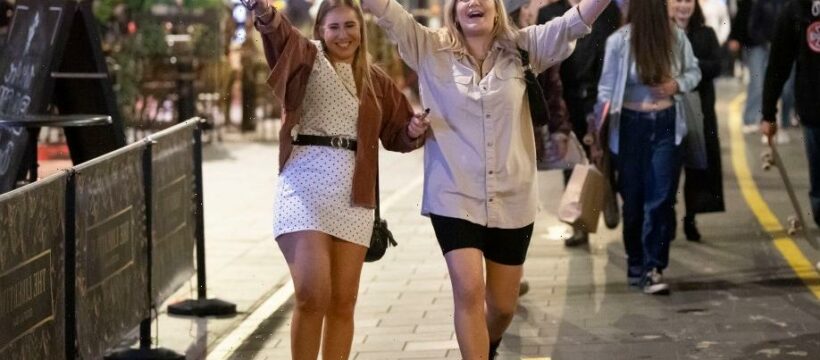ORDERING Brits to stay at home in a bid to tackle coronavirus doesn't work as they won't obey – but banning big public events does, experts say.
The crucial R rate drops by just three per cent after a full month of ordering people to stay indoors.
⚠️ Read our coronavirus live blog for the latest news & updates
A ban on gatherings of more than 10 cuts the rate by the same amount – despite the UK's 'rule of six'.
And researchers at Edinburgh University say the problem is making people obey the strict laws.
Writing in the Lancet journal, authors of the study say the most significant intervention is banning public events, which reduces the R rate by 24 per cent in just four weeks.
Major events including the Cheltenham Festival and the Champions League clash between Liverpool and Atletico Madrid went ahead at the start of the crisis.
Professor Harish Nair assessed pandemic measures in 131 countries before writing his report on what works – and what doesn't.
He said: "If you tell people to stay at home, it is very difficult to ensure compliance.
"If you ask people not to meet in groups, you have the same problem – it's about adherence.
"Banning mass events or closing schools, on the other hand, ensures compliance."
Shutting schools in the UK reduced the R by 15 per cent. Their reopening was associated with a large increase in R.
However, Professor Nair said: "We found an increase in R after reopening schools but it is not clear whether the increase is attributable to specific age groups."
Overall, researchers discovered that very few restrictions have a significant impact on their own – and that only using large-scale interventions has an effect.
The Government's Sage scientists calculated that the March lockdown, including the order to stay at home, resulted in a 75 per cent reduction in the R rate.
At 6pm today, all of Wales will go into a 17-day 'firebreak' lockdown to halt the spread of coronavirus.
All non-essential shops, pubs, bars, restaurants and hotels will be forced to shut altogether during the restrictions.
And supermarkets will be able to sell just 'essential' items – prompting shoppers to rush out for goods after the Welsh government was unable to clarify what would be classed as a must-have.
How did researchers make their calculations?
Academics looked at a series of measures individually and in combination.
First of all, the team looked into previous studies on measures like school closures, social distancing and lockdown.
They found those can reduce the R rate significantly to near or below one.
They then analysed data from 131 countries and measured the time between the restrictions and changes in the R rate.
This meant they could estimate the effect of up to 28 days on the R rate after the measure was put in place.
The experts looked at everything from a ban on events and limiting gatherings to a full lockdown.
And they discovered that the least comprehensive package of restrictions – meaning, more than one individual measure – would still reduce R by 29 per cent within 28 days.
That's four per cent more than the most effective individual measure – banning public events such as sport matches and concerts.
In contrast, the most comprehensive package – similar to a lockdown including school closures and limits on movement – would lead to a 52 per cent reduction.
Meanwhile, South Yorkshire will be plunged into a tier three lockdown from Saturday – with Sheffield, Rotherham, Doncaster and Barnsley facing tougher rules after a £41million deal.
Greater Manchester is now in tier three after talks between mayor Andy Burnham and Boris Johnson failed this week.
Leaders in northern regions have been previously warned that more could follow Manchester into tough new restrictions after days of battling between Mr Burnham and No10 over cash.
Mr Burnham yesterday invited Mr Johnson to the city for face-to-face talks to "clear the air".
He says he doesn't want a "lingering political argument" with the PM.
And during a press conference at Downing Street, Mr Johnson denied he had 'gone to war' with Mr Burnham and other leaders in the North.
Chancellor Rishi Sunak last night announced more support for the stricken night-time sector.
The Treasury's new package includes making the Job Support Scheme, which replaces the current furlough system, more generous and grants of £2,100 available for firms in tier two areas of England.
Payments will be backdated to August.
This week, Mr Johnson said the country is on a "narrow path" – and that he can't "rule out" further measures.
However, he is still resisting pressure for a full nationwide 'circuit-breaker' lockdown – and one of his top academics said it wouldn't be fair.
England's deputy chief medical officer Jonathan Van-Tam said during a Downing Street press conference: "Pretty much everywhere in England is now heating up to some extent.
"We are trying to walk a very fine line between getting the virus under control in areas where it's out of control, and incurring the minimum amount of economic damage in doing so.
Most read in News
'not a bad boy' Mum DEFENDS thug son who left girlfriend Angel disabled in shock statement
Chilling moment rapist carries woman along the streets before attack
Comedian Joe Lycett sparks chaos after 'leaking' Sue Gray report on Twitter
Nicola Sturgeon sparks fury by trying to make her lockdown powers permanent
"In the areas where it is out of control, hard measures are needed.
"But do I think right now it is appropriate to insist on similar hard measures in, for example, south-west England or Kent, where levels of disease are really very, very much lower than in the North of England?
"No, I don't think that's right."
Source: Read Full Article















